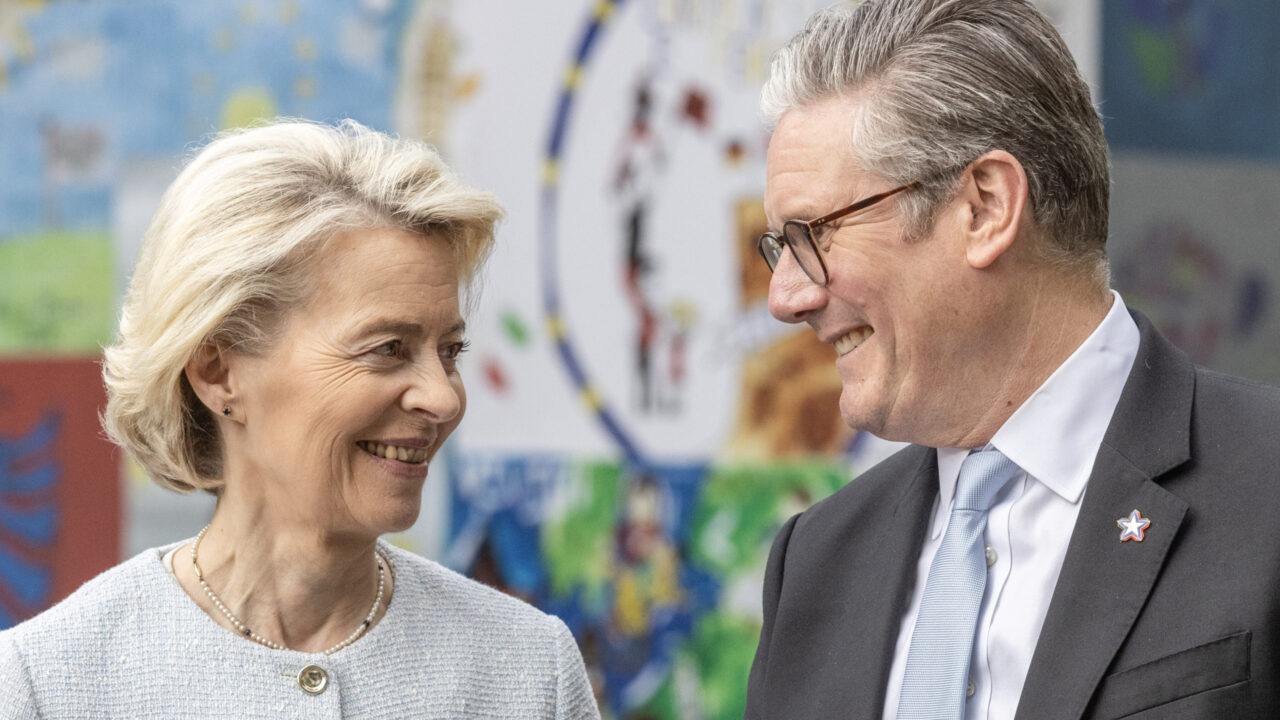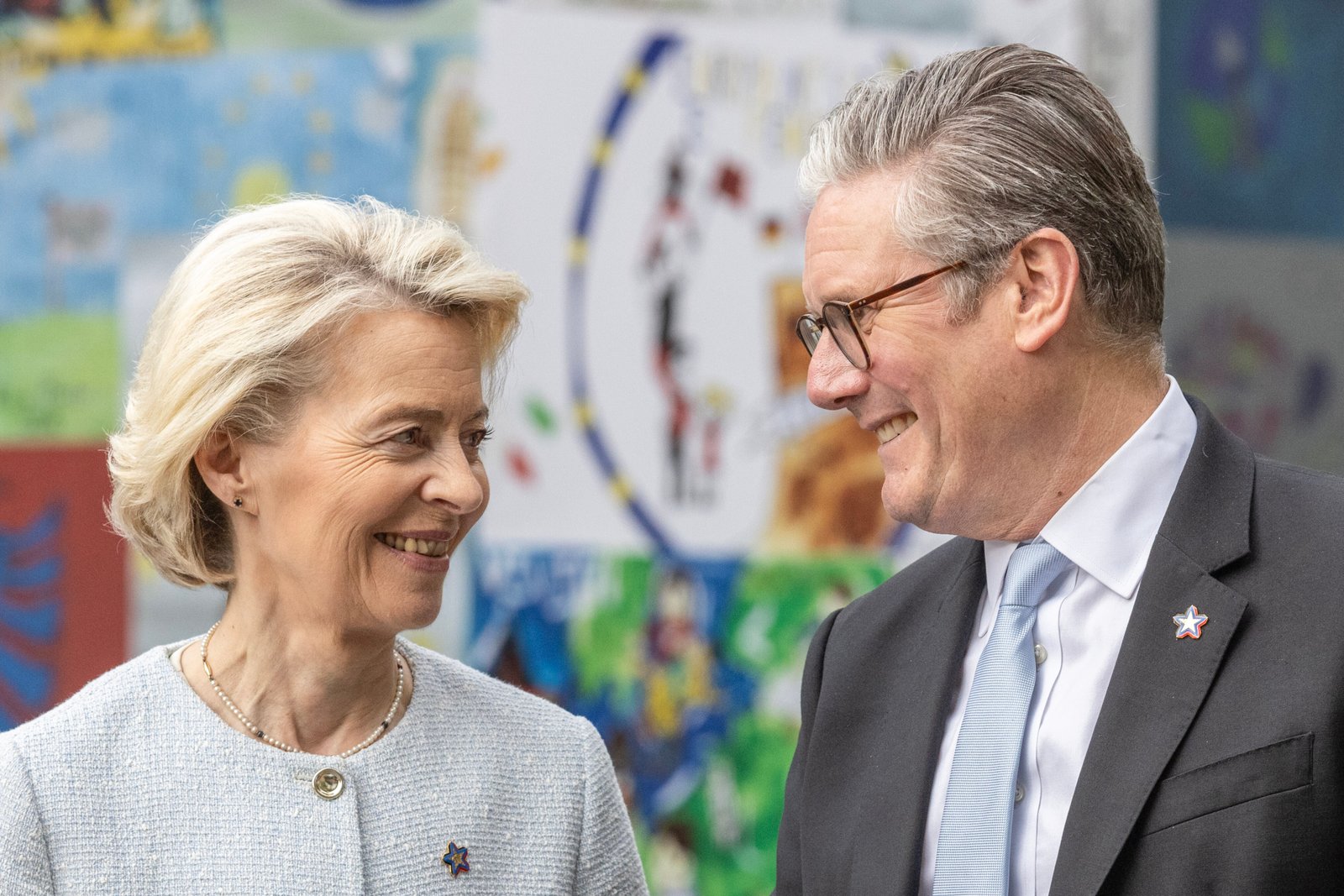The return-to-work pitches of European Commission president Ursula von der Leyen and British prime minister Kier Starmer sketch two very different pictures: one was full of ambition and strength, the other was sorely lacking
![]()
Senior Policy Fellow
- Commentary
- 3 minute read

The return-to-work pitches of European Commission president Ursula von der Leyen and British prime minister Kier Starmer sketch two very different pictures: one was full of ambition and strength, the
Image by picture alliance / Photoshot
©
Ursula von der Leyen, president of the European Commission, has evidently done a lot of thinking over the summer. Europe has faced a sea of troubles, and so has she—wrestling with a succession of global shocks, the perennial but worsening problem of EU disunity, and pressures from both left and right in the European Parliament.
So, she has come out fighting. Her state of the union speech on September 10th pulls no punches about the problems Europe faces. But it responds with boldness—even defiance—and ambition. She offers a slew of new initiatives across the range of European anxieties and dissatisfactions. She doubles down on support for Ukraine and European defence, and promises major investment in science and technology, clean energy and artificial intelligence. She targets poverty, with a particular focus on energy and housing costs. And she studs her speech with eye-catching specifics: support for using Russia’s frozen assets for Ukraine via reparation loans; a promise to take over global vaccine leadership from America; and financial and trade penalties for Israel over its war on Gaza. Not everything has gone down well with everyone (the last being particularly controversial). But she has made a bold statement of intent and a full-throated attempt to set the autumn’s agenda.
Meanwhile, in London, prime minister Keir Starmer has had a nightmare return to work. The commentariat have spent the summer weeks demanding to know what the Labour government stands for. They are calling for an effective political narrative to pitch against Nigel Farage’s far-right Reform UK party, who have been making all the headlines on the issue of immigration. All that Starmer has offered is the promise of a “Phase Two” for his deeply unpopular government, with a “relentless focus on delivery”, and some personnel changes in his office—morphing into a cabinet reshuffle after the sudden forced resignation of his deputy prime minister and party deputy leader (closely followed by the need to sack his ambassador in Washington). These personnel problems cannot be shrugged off as bad luck; a wallowing ship making no headway is especially vulnerable to rogue waves.
Starmer’s managerial competence would have been well suited to the top job in a period of stability: but these times call for leadership
Not that Starmer has been idle over the summer. He has been busy on the international scene. What he has evidently not done, however, is reflect on or come up with an agenda beyond “more of the same, but better”. Now he faces an autumn promising little but internal Labour Party fights over the choice of the new party deputy, and seemingly endless speculation about tax rises in the budget due at the end of November. Starmer’s managerial competence would have been well suited to the top job in a period of stability: but these times call for leadership.
In part, this is a question of language. Von der Leyen did not hesitate to talk about values, and to say things as she sees them: “Our democracy is under attack.” Poverty elimination is a matter of “basic social justice”. America must understand that “on environmental or digital regulation…Europe will always decide for itself”. Europeans must now act against “the tsunami of Big Tech flooding their family homes”, with “algorithms that prey on children’s vulnerabilities with the explicit purpose of creating addictions”.
It is not that Starmer would necessarily disagree with most of what von der Leyen had to say. But his native caution makes for bloodless rhetoric, and what former Labour leader Neil Kinnock has termed “an audacity deficit”. So the field has been left clear for Nigel Farage, the man whose warnings of “societal collapse” in “lawless Britain” primed the summer’s tensions over “illegal migrants”, and who has just travelled to Donald Trump’s Washington to compare Britain to North Korea.
Starmer supporters might argue that von der Leyen has it easy: the EU is a much bigger beast than post-Brexit Britain, which cannot ignore its economic and technological dependencies on America. And, indeed, Starmer’s assiduous courtesy to the US president has been wise, if also painful (as Trump’s upcoming state visit to the UK will no doubt be). But he should be able to rely on his thumping parliamentary majority to get his legislation through, unlike von der Leyen, who has to negotiate with 27 fractious member states (including two Russian Trojan horses) to achieve most of what she wants. For any leader, the necessary first step must surely be a clear and emotionally persuasive account of where they are headed.
There is still time for Starmer to seize the initiative this autumn. The Labour Party conference begins on September 18th. He needs to tear up whatever leader’s speech is currently being developed, with its predictable bureaucratic themes of “delivery”, “economic stability” and (yet again) “kick-starting growth”, and take a leaf out of von der Leyen’s book. He needs to show a real understanding of the country’s worries and frustrations and then offer ambitious plans to address them, accompanied by a clear sense of the country he wants Britain to be. The British ship is in heavy seas, and the captain must make his destination clear and his presence felt.
The European Council on Foreign Relations does not take collective positions. ECFR publications only represent the views of their individual authors.
Author
![]()
Senior Policy Fellow
